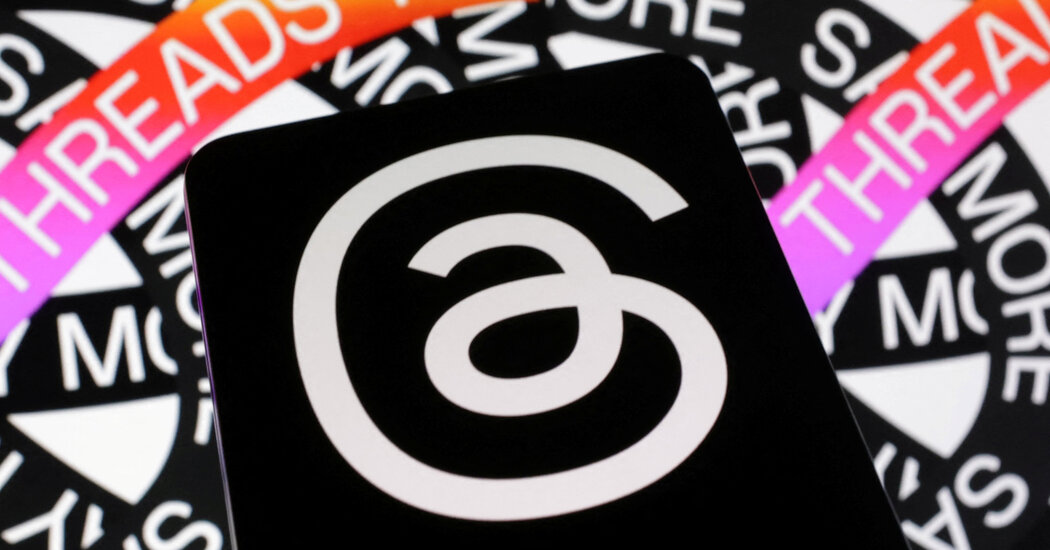
There’s a hot new squiggle on the tech logo scene.
On Wednesday, Mark Zuckerberg unveiled Threads, a rival to Twitter that appears to be the most rapidly downloaded app ever. Each new user is greeted by the app’s logo, a springy, counterclockwise coil usually rendered in white against a black background.
The logo most closely resembles the @ symbol present in Twitter handles and email addresses. It is just abstract enough, however, to have earned many other comparisons.
Online, people have speculated that the logo represents the letter G, the number 6 or letters of the Tamil and Malayalam alphabets. An edited image of Homer Simpson is circulating in which the character’s ear has been replaced by the logo. Others have detected similarities to a snippet of thread or a curly piece of hair.
“If a Möbius strip and an ampersand had a kid, it would sort of look like that,” said Rob Janoff, the designer who created the rainbow Apple logo.
Mr. Janoff said the logo’s ambiguity will probably end up helping people remember it. He likes the logo, which he said is close enough to the @ sign to feel familiar to viewers but distinctive enough to attract their attention.
The graphic designer Jessica Walsh thinks it is a little too confusing. “I didn’t understand it when I saw it,” she said in an email. She said she would have tried to put the letter “T,” for “Threads,” at the center of the logo instead.
Like most modern corporate icons, the Threads logo is required to be highly adaptable. It must be legible on a billboard or a phone screen, and must register with customers who speak a variety of languages.
The design may also be aimed to improve Meta’s damaged public image, said Michael Evamy, the author of “Logo,” an anthology of corporate brands and logos. “New identities, by their nature, are meant to mask the weaknesses or faults of an organization and project a certain set of values,” he said.
The loopy design of the Threads logo appears friendly and nonthreatening, Mr. Evamy said. He compared it to a piece of spaghetti. “When you see it, you forget for a moment about who and what’s behind it,” he said.
Tech companies have increasingly settled on minimal, single-line symbols to represent their brands. In Apple’s App Store, the Threads logo sits atop TikTok’s music note, Snapchat’s ghost and YouTube’s arrow.
The Threads logo both extends and jolts the ultrasmooth logo trend, said Fons Mans, a designer and the founder of 10X Designers. “It has a freehand feel to it,” he said. “It makes it feel a little more human than those pixel-perfect logos we’ve seen in tech in the past few years.”
Some streamlined logos have irritated designers. When Facebook changed its name to Meta in 2021, it introduced a blue infinity icon that drew a muted response for its perceived lack of imagination. “We needed to future-proof the symbol,” Meta’s design team said.
According to Meta, the Threads logo is realized in Instagram’s sans serif font and is inspired by the @ sign.
The lively, asymmetrical Threads logo may indicate that designers at Meta are aware of those criticisms. Renato Valdés Olmos, a former director of design at Lyft, said the Threads logo is noticeably more “outspoken” than Meta’s.
“It’s very much a designer’s logo,” he said. Its white-on-black palette is “goth,” he added, and its lack of harsh edges implies the kind of easy-flowing communication that the app is attempting to facilitate.
Threads is the latest Twitter competitor to nod to the platform’s visual identity, which is represented by a sky-blue bird. The alternative social platform Mastodon also selected an animal (albeit an extinct one) as its mascot. And both Mastodon and Bluesky, another competitor, were splashed with hues of blue not too distant from Twitter’s.
Ramesh Srinivasan, the director of the University of California Digital Cultures Lab, said the Threads logo is a shrewd reference to a different piece of Twitter’s iconography: the @ symbol, which appears before each Twitter user’s personal handle and has become deeply associated with the platform.
“It’s basically saying, Hey, we’re Twitter,” he said. “It’s a clever interface in what it expresses, but I don’t find it visually alluring.”
Many Twitter users have also criticized the logo — comparing it to the number 666 and a strand of pubic hair — perhaps out of allegiance to their preferred platform.
Mr. Valdés Olmos said that logos often spark intense reactions online because each can be a convenient outlet for a person’s feelings about a brand. “The logo is the first thing you tap, the first thing you get greeted by,” he said. “That makes it an easy target for a lot of folks.”
Mr. Evamy is confident the Threads logo will weather its round of online teasing. He thinks the abstract design may even be more durable than Twitter’s blue bird, which is rendered in a pictorial style that he said now feels dated.
“If Twitter were starting again, they would probably want to have something this good for their own logo,” he said.






